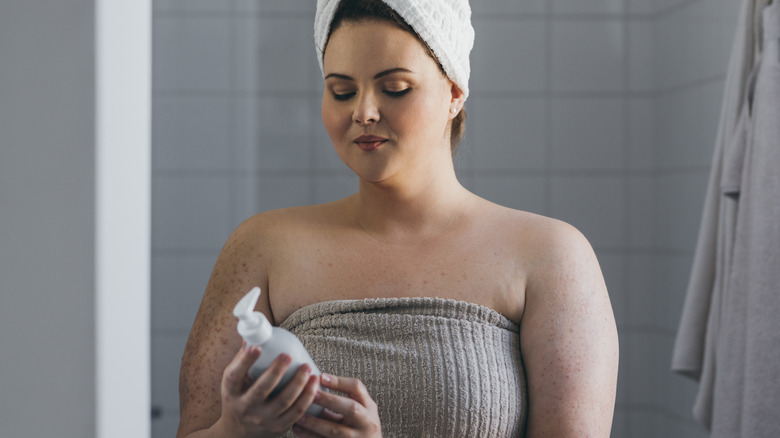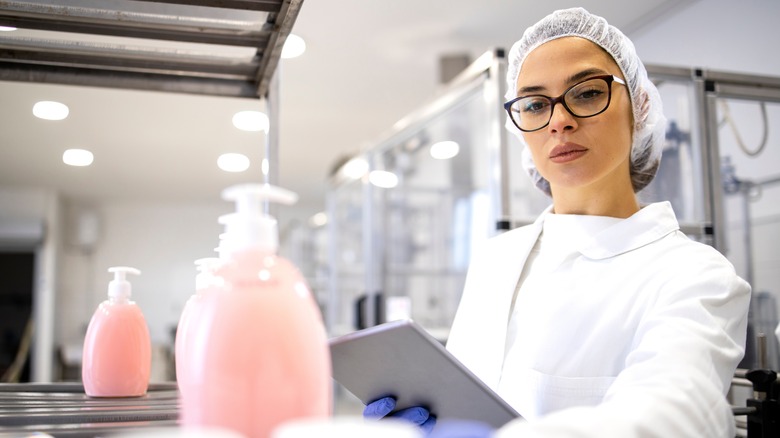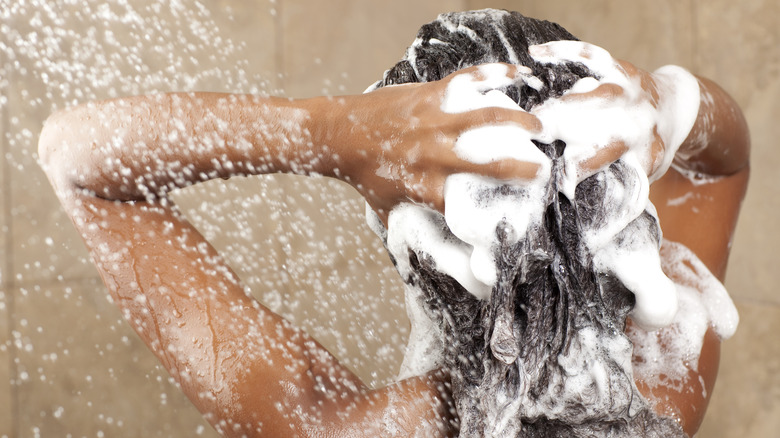The Risky Ingredient That Could Be Lurking In Your Shampoo Bottle
With the clean beauty movement and things like dirty lists in the cosmetic care world, people are now more concerned than ever about what ingredients they're putting on their skin. In fact, you probably already have a list of ingredients you don't want to see in your makeup. As green cosmetic chemist Yashi Shrestha told Byrdie, "A study by EWG (Environmental Working Group) notes that a woman applies about 168 different chemicals every day. This exposure accumulates over time, and so it is important for people to opt for products that are cleaner and better for our health."
Enter the topic of a supposedly risky ingredient that could be lurking in your shampoo bottle — PEG, short for polyethylene glycol. PEGs are found in everything from toothpaste to creams and lotions, and even your shampoo. Just turn the bottle around and read the list of ingredients; and, chances are, you'll find PEG listed in there. They might appear as PEG-16 or PEG-10, etc. PEGs are used by manufacturers because they act as humectants and preservatives and help other skincare products penetrate your skin better, explains Healthline. In shampoos, they can perform the role of emulsifiers and surfactants, shared board-certified dermatologist Dr. Whitney Bowe (via YouTube).
Googling PEG might lead you to pages that use the words "carcinogenic" and "toxic" to describe the ingredient. But, as explained by Dr. Bowe, "PEGs themselves are not dangerous but during their production, carcinogens are used and carcinogens are released and carcinogens are produced." Why does this make PEG a risky ingredient?
PEG-based shampoos could be risky to workers
The likelihood that carcinogens produced and released during the production of PEGs would find their way into your shampoo bottle is very small, if not non-existent, say the experts. But one of the good things about clean beauty and the increasing focus on the environment is that retailers and customers are becoming more aware of how certain ingredients could be putting the health of those who manufacture them at risk.
And this is one of the concerns with PEGs. Carcinogens like ethylene oxide and 1,4-dioxane released during the manufacturing process could be potentially damaging to the health of the workers who might come into contact with them. Even if the amounts released are small, this can be offset by the cumulative effect of hours and hours spent at their jobs, explained Dr. Bowe.
Short contact with ethylene oxide has been linked to respiratory issues, lung injury, shortness of breath, diarrhea, and vomiting, according to the Occupational Safety and Health Administration. There is also a risk of cancer and reproductive issues with chronic exposure to ethylene oxide. The Agency for Toxic Substances and Disease Registry notes that acute exposure to 1,4-dioxane can cause skin, throat, nose, and eye irritation. More research on PEGs might bring up articles that claim they are harmful to the environment. However, there is not enough scientific evidence to support this claim.
Some other things to consider about PEGs
While topical application of PEGs that come in shampoos, creams, and lotions won't generally cause harm to your skin, this might not necessarily be true for some skin types. If you have particularly sensitive skin and skin conditions like scalp eczema or a history of allergies, you may want to run this by your dermatologist before use. PEGs might be on the list of ingredients that shouldn't be in your shampoo bottle in such an instance.
"The problem with propylene glycol is that it not uncommonly causes allergic reactions in the skin, known as contact dermatitis," shared a board-certified dermatologist and an associate professor at the Mount Sinai Hospital in NYC, Dr. Joshua Zeichner (via Healthline).
Furthermore, since PEGs help other skincare products absorb better into your skin, prolonged use of it could increase the risk of other harmful toxins lurking in the environment being absorbed into your body, shared functional medicine consultant Dr. Jill Carnahan. At the end of the day, it's important to know that social media and some dirty lists promoted by companies also have a tendency to cause fear-mongering. So, while knowledge is a good thing, the right kind of knowledge is even more important.



